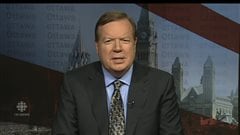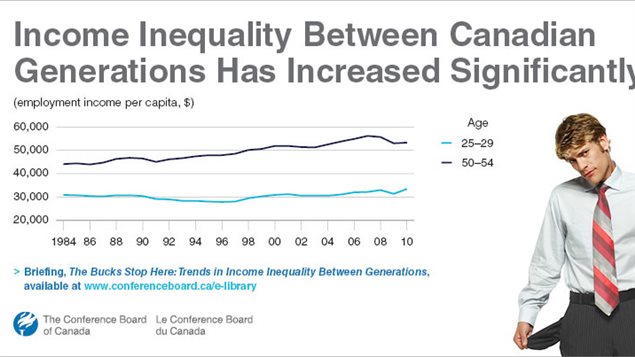The old adage of get a good education, study hard, and get a good job and get ahead, just doesn’t seem to hold true any more.
David Stewart-Patterson is a vice president of the Conference Board of Canada, a not-for-profit think tank. He is also the co-author of a new report saying the income gap between young workers and older workers has been growing wider as years go by, and could well lead to societal problems.
ListenIt used to called a gender-gap, where men were getting higher pay than women for work in similar jobs.That gap has lessened but now the gap is widening between generations, or an age-gap.

The report is called “The Buck Stops Here- Trends in Inequality Between Generations”
Whereas a student in the past might get a temporary or part-time job to help pay their way through school, they’re now finding they have to stay in that low-paying job.
In addition, whereas their parents might also have held that same kind of temporary or even entry-level job, the salaries paid now have not kept up with inflation.
David Stewart-Patterson says they began the study because of the increasing number of anecdotal stories of skilled trades or university-educated students having remain living with their parents and working at part-time or low paying jobs. Even pay scales at entry-level career jobs have not kept up with inflation over the years. He pointed out that top Canadian earners fought for principles of equal work for equal value, yet their children now face lower wages and reduced pension benefits even if they’re doing the same work at the same employer.

“We need average employment incomes in the years ahead to go up, and yet younger Canadians are falling behind,” said Stewart-Patterson. “This is a trend that could have serious consequences for employers, for labour unions, for governments and for communities. If the earnings of younger workers continue to lag, we also could see growing conflict within our society between older haves and younger have-nots.”
Using Statistics Canada income figures, the study found that in the 1980’s the difference in average incomes (income-gap) between younger workers and older workers was around 47 percent. By 2010 that gap had widened significantly to about 64 percent.
Stewart-Patterson says the wage gap has the potential to create social tensions from youth on the one hand, while on the other, the aging population will need well-paid younger workers to maintain the tax base which provides public services such as health care where needs and costs are continually rising.
With the cost of home ownership rising, rental costs rising, and all other costs including tuition and basic necessities also going up one the one hand, while young Canadians face precarious work situations and stagnating wages, the economy is increasing on shaky financial footing.
David Stewart-Patterson says, “That creates an issue in how much governments can raise in tax revenues, how much can our economy grow?”







For reasons beyond our control, and for an undetermined period of time, our comment section is now closed. However, our social networks remain open to your contributions.